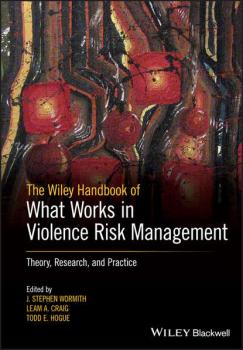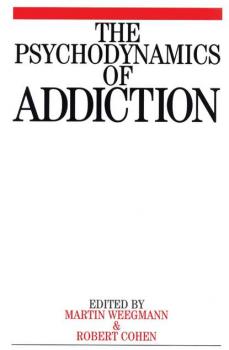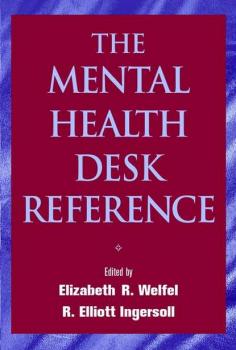Общая психология
Различные книги в жанре Общая психологияThe Wiley Handbook of What Works in Violence Risk Management
A comprehensive guide to the theory, research and practice of violence risk management The Wiley Handbook of What Works in Violence Risk Management: Theory, Research and Practice offers a comprehensive guide to the theory, research and practice of violence risk management. With contributions from a panel of noted international experts, the book explores the most recent advances to the theoretical understanding, assessment and management of violent behavior. Designed to be an accessible resource, the highly readable chapters address common issues associated with violent behavior such as alcohol misuse and the less common issues for example offenders with intellectual disabilities. Written for both those new to the field and professionals with years of experience, the book offers a wide-ranging review of who commit acts of violence, their prevalence in society and the most recent explanations for their behavior. The contributors explore various assessment approaches and highlight specialized risk assessment instruments. The Handbook provides the latest evidence on effective treatment and risk management and includes a number of well-established and effective treatment interventions for violent offenders. This important book: Contains an authoritative and comprehensive guide to the topic Includes contributions from an international panel of experts Offers information on violence risk formulation Reveals the most recent techniques in violence risk assessment Explains what works in violence intervention Reviews specialty clinical assessments Written for clinicians and other professionals in the field of violence prevention and assessment, The Wiley Handbook of What Works in Violence Risk Management is unique in its approach because it offers a comprehensive review of the topic rather than like other books on the market that take a narrower view.
Aproximação À Neuropsicologia
Falar de neuropsicologia é falar de um dos ramos que mais cresceram nos últimos anos, uma vez que se baseia nos avanços da psicologia e da neurociência.
反向语音 在 理论与实践中
理论与实践中的逆向演讲》历时4年,详细介绍了人们如何利用其潜意识来预测赛马或他们想要的任何其他场所的结果。该书由戴维·约翰·奥茨(David John Oates)的学生,经认证的反向语音分析员约书亚·施穆德(Joshua Schmude)撰写,将读者带入了一项精神探索,发掘了自己灵魂内的潜能。 本书详细介绍了澳大利亚研究人员大卫·约翰·奥茨(David John Oates)的理论,他发现并发展了与反向演讲相关的基本理论,该书于1987年出版在他的第一本书《超越向后掩盖》中。由获得认证的逆向语音分析师Joshua Schmude撰写,它使读者深入自己的灵魂深处,并使用定性研究方法,教给任何人他们如何使用自己的语音逆向来预测未来相关事件的结果与赛马或他们希望的任何其他实际领域。这项工作中提出的假设肯定会改变任何以开放的心态阅读本书的人的生活。
The Therapist's Starter Guide
Understand all the aspects of beginning and sustaining a therapeutic practice with The Therapist's Starter Guide: Setting Up and Building Your Practice, Working with Clients, and Managing Professional Growth, a practical, hands-on guide to professional fulfillment and business success. If you’re a new practitioner or seek to grow your practice, this book will provide you with the skills you need to succeed, thrive and grow professionally and personally. Equip yourself with the knowledge you need to transition to a new job or to begin your own practice.
The Rorschach, Advanced Interpretation
The fully revised and expanded edition of the premier guidebook to Interpreting the Rorschach For the last three decades, Dr. John Exner's Comprehensive System has been the leading approach worldwide to administering and interpreting the Rorschach Inkblot Test. Comprised of three volumes, The Rorschach(r): A Comprehensive System is the authoritative reference for the administration, scoring, and interpretation of the Rorschach. This Third Edition of Volume Two: Advanced Interpretation, with new and updated information and case studies, provides an essential companion to the basic foundations and principles outlined in Volume One: Basic Foundations and Principles of Interpretation. New to this edition: * All-new case studies describing accurate use of the Rorschach in the assessment of children, adolescents, and adults in a variety of clinical and forensic settings * New research developments * New additions to Exner's Comprehensive System * Expanded reference data, including nonpatient data * Expanded coverage of the cluster approach to organizing data for interpretation The leading guide to the study and implementation of the Rorschach for more than three decades, this latest volume from John Exner and Philip Erdberg is must-reading for any serious scholar or user of the Rorschach.
The International Handbook of Stepfamilies
Written by contributors from around the world, The International Handbook of Stepfamilies: Policy and Practice in Legal, Research, and Clinical Environments is a collection of research, legal, and clinical recommendations that fills a growing need for complex, re-formed families. Using the information in this book, which includes contemporary research and its implications, you will be able to consider stepfamilies in an international context. Understand the issues that clinicians face when they work with stepfamilies, both before and after formation, and gain more knowledge about this topic as the rates of family reformation increase.
Handbook of Addictive Disorders
The most comprehensive source for the latest research and practice techniques for diagnosing and treating addictive disorders «This book brings together an array of international experts on addictive disorders. Robert Coombs's Handbook of Addictive Disorders discusses the contemporary issues surrounding the understanding of addiction, from diagnosis to treatment of an addicted client. The Handbook of Addictive Disorders is an example of practical and clinical information at its best.» -Lorraine D. Grymala, Executive Director American Academy of Health Care Providers in the Addictive Disorders The Handbook of Addictive Disorders: A Practical Guide to Diagnosis and Treatment is a comprehensive, state-of-the-art resource, featuring valuable contributions from a multidisciplinary team of leading experts. This unique guide deftly defines addiction and examines its comorbidity with other problems. Subsequent chapters present an overview of addictive disorders coupled with strategies for accurately diagnosing them, planning effective treatment, and selecting appropriate interventions. Chapters on public policy and prevention are of indispensable value in light of this growing health concern. The only reference available to cover the full spectrum of addictions and addictive behaviors, the Handbook of Addictive Disorders provides the most current research and treatment strategies for overcoming: Chemical dependency Workaholism Compulsive gambling Eating disorders Sex addiction Compulsive buying This useful guide features case studies, figures and diagrams, lists of practical interventions for each disorder, and self-assessment exercises for clients. Psychologists, addiction counselors, social workers, and others working in the addictions field will find the Handbook of Addictive Disorders to be an essential resource for practical, validated information on all types of addictions and their related problems.
The Psychodynamics of Addiction
In the treatment of addictions and their psychological understanding, cognitive-behavioural and motivation approaches have been paramount. In contrast, the psychodynamic contribution has been muted. This book redresses this imbalance by bringing together a team of senior clinicians with psychotherapeutic backgrounds as well as extensive experience in addiction. Stress is placed on the diversity of psychodynamic understanding and its relevance to the everyday problems met by addicted individuals. The first theoretical part of the book is followed by examples from group and individual therapy, and the foreword is written by Dr Edward Khantzian. The Psychodynamics of Addiction will be of interest to psychotherapists who may lack experience in addiction, and to other clinicians working in the field – doctors, nurses and psychologists. Introduction – Review of Different Schools: Container and Contained: The School of Bion – The Application of Bowlby’s Attachment Theory to the Psychotherapy of Addictions – The Vulnerable Self: Heinz Kohut and the Addictions – Therapy: Dynamics of Addiction in the Clinical Situation – Psychodynamic Assessment of Drug Addicts – Individual Psychotherapy with Addicted People – Group Therapy for Addiction – Helping the Helpers: Psychodynamic Perspective on Relapse Prevention in Addiction – In Search of A Reliable Container: Staff Supervision in a DDU -Countertransference with Addicts – Addiction and the Family: Growing up with Alchohol or Drug Abuse in the Family – References – Index
A Woman's Journal
In this new edition, Stephanie Covington includes important new evidence-based data and new proven techniques for her unique and exclusive program, as well as new ways to treat trauma and substance abuse, new principles for gender responsive strategies with women offenders, and a new module on sexuality and women's recovery. Also, women who have been using the book have written in many small changes and corrections in the directions and exercises. The latest, and most up-to-date theory and practice for this very focused but substantial field of treatment. A Woman's Journal is tied seamlessly to the facilitator's guide. It contains exercises for use in group sessions, summaries of information presented from the facilitator's guide, and reflection questions and activities for use after group sessions.
The Mental Health Desk Reference
A practical, easy-to-use, and comprehensive reference for mental health professionals The Mental Health Desk Reference is the ultimate guide to effective and responsible mental health practice. It provides authoritative, concise, and up-to-date information from more than seventy experts regarding diagnosis, treatment, and ethics of practice. Each entry summarizes key constructs and terminology associated with the topic, major findings from research, and specific recommendations on theory and practice. Important topics covered include: * Adjustment disorders and life stress * Diagnosis and treatment of adults * Diagnosis and treatment of children * Crisis intervention * Diverse populations * Group and family interventions * Practice management * Professional issues * Ethical and legal issues * Professional resources These detailed, readable entries-based on the most extensive and reliable research available-form a comprehensive, straightforward, and quick-reference resource applicable to practitioners across every field in mental health. The Mental Health Desk Reference is the single resource no mental health professional can afford to be without.









